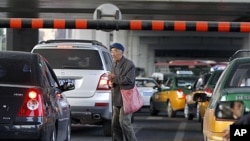China's rapid economic growth slowed slightly between July and September, due to slowdowns in Europe and the United States and inflation-fighting measures at home.
The government's statistics bureau says the nation's economy grew at a 9.1 percent annual pace in the three months through September 30. That compares to 9.5 percent growth in the previous three months.
The figures were released by officials at China's National Bureau of Statistics.
"So the average growth of the economy, as shown by many of the important indicators, has slowed down somewhat, but it still maintains a steady and stable growth," an official stated.
Spokesman Sheng Laiyuan said that despite the slowdown, China is still enjoying steady and stable growth.
China's booming economy has been a major engine in the growth of the global economy, but the European debt crisis and high unemployment in the United States have weakened demand for Chinese-made goods.
Chinese policymakers have also taken steps to cool the economy, including a series of interest rate hikes and requirements that the nation's largest banks increase their cash reserves. "Our overall evaluation is that, in the past 3 quarters, it is safe to say that the national economy is generally on the right track and is benefiting from our macro-control policies," a policymaker noted.
Sheng said the latest figures indicate the government's inflation-fighting policies are working.
Many Chinese business owners agree that inflation, not slow growth, is the biggest threat they face.
"For me it was around August or September when I really started to feel that my suppliers where raising their prices. So by the time it gets to us - the secondary or tertiary purchasers of the goods - it has already risen by 20 or 30 percent. So in order to continue selling to our customers we have not been able to raise prices that much - our profits have been reduced," one business owner said.
Handicraft shop owner Sun Li said her costs for materials have risen by 20 to 30 percent. And that is cutting into her profits.
China's annual inflation rate has come down slightly in recent months but remains above 6 percent.
Despite the problems, retail sales in China last month were 17.7 percent higher than in the same month last year.
Some information for this report was provided by AP, AFP and Reuters.















